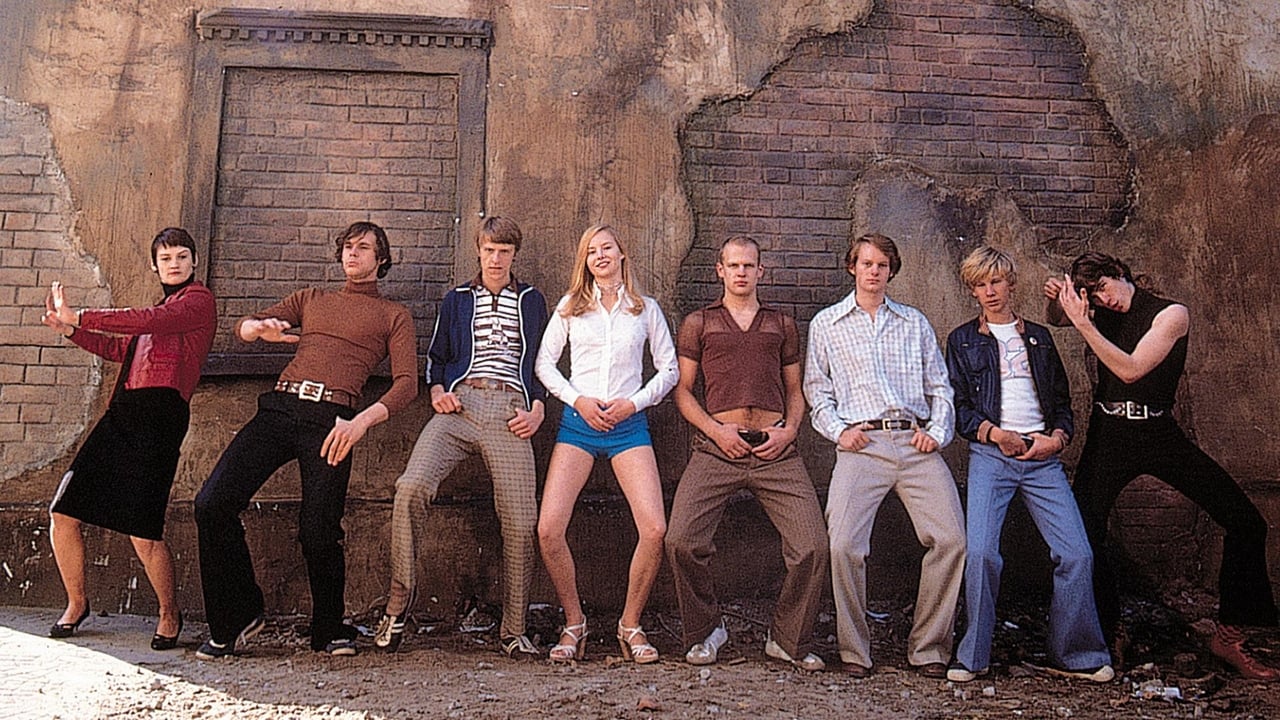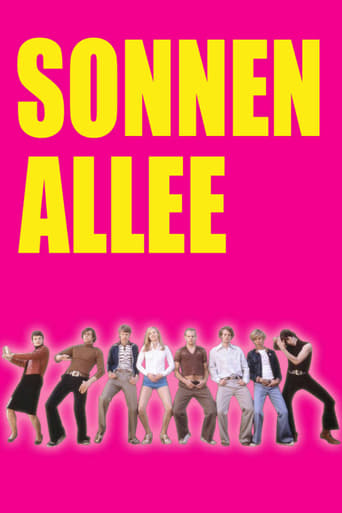

"Sonnenallee" is a German 85-minute movie from almost 20 years ago that features some of Germany's biggest rising stars from around that time in Alexander Scheer, Robert Stadlober and Alexander Beyer. They may not be too well-known today anymore, but back then they were. And there are some more established actors on board too, such as Henry Hübchen, Katharina Thalbach and Detlev Buck. It's not really their fault that this film is not working for the most part. There is a touch of "Goodbye Lenin" to it as it depicts life in the GDR of especially younger people, but it's all less refined and does not feel right on many occasions. The writer and director is Leander Haußmann, certainly well-known here in Germany, and I felt at times that he tried to make a mix of stuff like coming-of-age films like "The Breakfast Club", but also included the political context that has been overdone by now in German cinema.And in terms of the genre, nothing new is delivered by this movie here. I cannot say I enjoyed the watch a lot. It was obviously the filmmaker's intention to make almost all the characters likable, but the actors weren't good on several occasions, especially the younger actors and Stadlober in particular, who just isn't very talented. One of the few good things is that the film is fairly short, but it's still disappointing to see a team of so many writers work on a movie and the result is something as forgettable as "Sonnenallee". I cannot agree with all the awards attention that this film got. Haußmann has done better on several other occasions and it's a bit sad that this is probably his most known work to-date. I do not recommend the watch. Thumbs down.
... View MoreThe film Sonnenallee is a comedy of the absurd humor type, a bit like the Monty Python stories. A sense of humor is always rather personal, and to be fair the fun in Sonnenallee is not my thing. Maladjusted fun feels weird, and this makes the conception of this review a somewhat precarious undertaking. In Sonnenallee everything is chaotic. The characters are ill-contrived and unpredictable. They move in all directions, without pattern. There is a scene, where the main character Micha suddenly strikes down his friend, for the simple reason that he has accepted this narrow-minded job. The events have no understandable coherence, but arbitrary hop on and off your screen. Evidently the fact that I watched the "extended" version did not allay the confusion. Does it reflect the existentialism of Sartre, which is actually hailed in the film itself? Or is it an attempted alliance with the Nouvelle Vague? The story unfolds in a quarter of East-Berlin, in an alley immediately behind the illustrious Wall. Although the Wall is a stage-property that dominates many of the scenes, it remains an object without meaning or significance. If there are witted allusions, they are lost on me. More obvious hints would help. An example of the incomprehensible character studies: Micha has no pangs of conscience to enlist in the people's army. In one of the scenes at the Wall he even threatens to shoot down tourists, that are peeping from the west side. But at the same time, he keeps a diary, in which he taunts the allegedly repressive nature of the Leninist state. There can be no doubt: he is mentally unstable. You can allege that Sonnenallee is about a youth troop, whose members are in the process of trying to discover their own identity. But the adults in Sonnenallee are just as all-out deranged as the kids. The mother of Micha plans to defect to the west, on her own, but reconsiders and allures and seduces her dull husband. Two visitors in Berlin, who at home can not receive the western TV broadcastings, are impressed by their glitter and for hours sit gazing at the test screen. Joke: where is the English Channel? Answer: I don't know, my TV does not pick it up. To be fair, not all is bunk. Yes, tall exaggerations can be fun. For instance, there is this scene, where a young guest from Vietnam makes an allocution before an audience of pupils, in her own exotic language. Naturally she almost disappears behind the reading-desk. At the end the audience reacts elated. And: the teacher is indignant, or should I write shocked, because Micha has peed in the direction of her beloved "anti-fascist protection barrier". Joke 2: did you hear about the cross-eyed teacher? She could not control her pupils. So let us allow for some amusing moments in Sonnenallee. But it could be more. I had all-time expectations, considering the awkward theme of the clash of ideologies. To be fair, Sonnenallee avoids the demagogic and self-conceited atmosphere, that is alloyed in Goodbye Lenin. If you enjoy kids being silly, the film Berlin Ecke Schönhauser of Defa Studios also narrates about a youth troop. In Berlin, yes. Pronounce: Bearleen. This film dives deep into the commonplace temptations of East and West, without becoming too censorious. The translation is not all-in, as usual with Ice Storm. Or see my other reviews.
... View MoreI watched this film as it was recommended by a friend and also it could be incorporated into a project I have to do in my University.When I watched the opening 5 minutes I thought it would be another depressing look in the GDR culture, but the story line was up beat and kept me entertained throughout! My favourite part was when his friend is shot as there is a black out and they think people are going to try and run to get through to the West. However the bullet that 'hits' him, hits his LP instead and shatters the Rolling Stones LP which he had just bought. I also enjoyed at the school dance when the boys danced to T-Rex!!!! It was a great hindsight into the culture of the GDR, which in recent years has been noted for its oppressiveness. I like the light-heartiness of the film content and it is very similar in certain themes to "Goodbye Lenin" Enjoy!
... View MoreAs an American who lived in former East Germany for a time, I was impressed by the way this film portrayed the ambivalence many Ossis felt about the fall of the Wall. The characters were more nuanced and their treatment more sensitive than that seen in the more popular Goodbye Lenin which, while a good movie, is more about the character's relationship with his mother than it is an accurate portrayal of life in East Germany. Goodbye Lenin seems to reduce the Ossi existence to communist commodification -- to be an Ossi is about what kind of pickles you eat -- whereas Sonnenallee allows its characters to be much more than consumers. In interviews with the makers of Goodbye Lenin, they have mentioned that much of their inspiration for their treatment of East Germans came from TV shows on East Germans.... Sonnenallee presents the eastern life without the extra refraction of the television screen.
... View More